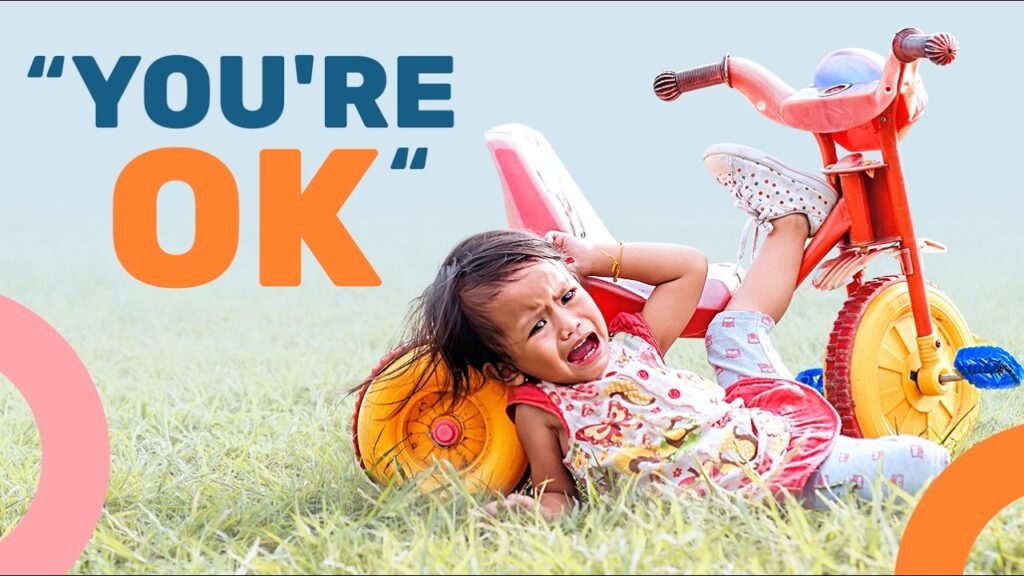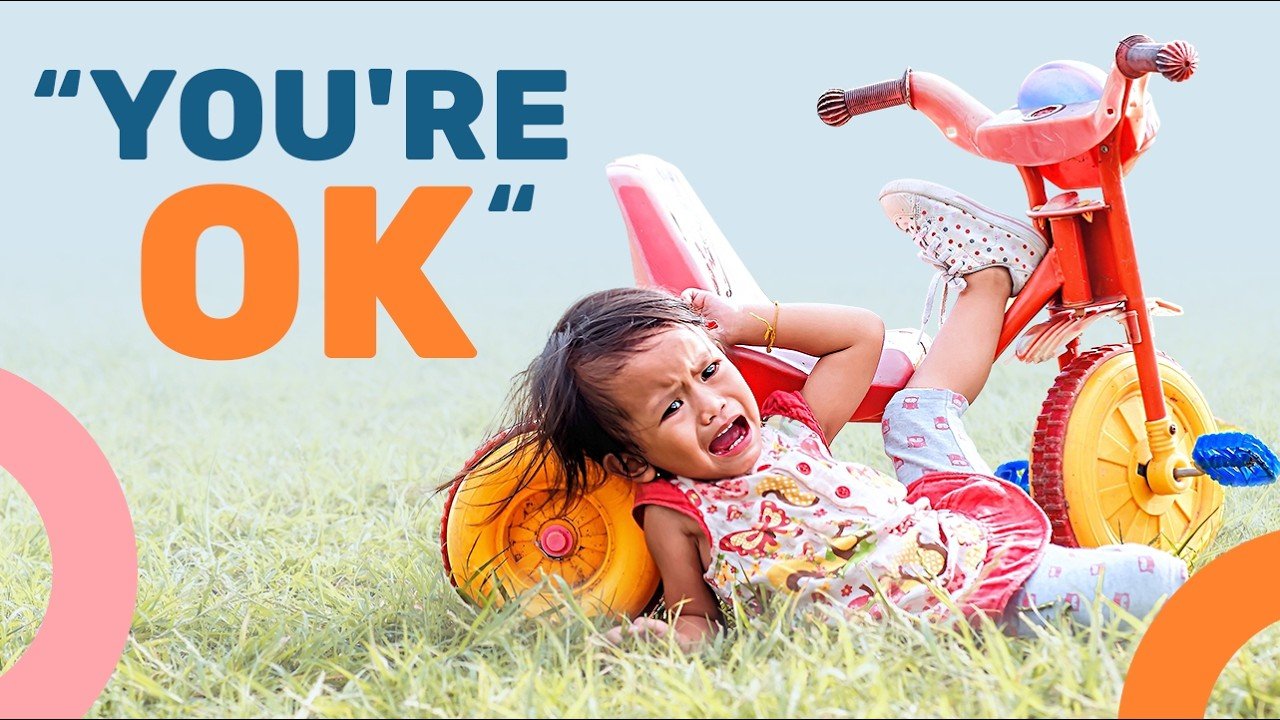When your toddler trips over a rock at the park, stumbles up the stairs, or trips over that toy that somehow ended up on the floor, it’s almost second nature to say “You’re okay” as you help them back up. You want to comfort them and saying “You’re okay” seems like the perfect way to do that. But here’s the thing, telling them “You’re okay” might not be as comforting as you think. In fact, using this phrase regularly can have unintended negative impacts on their emotional, social, and cognitive development. And it’s not the only phrase to be cautious about. There are two other phrases that I’m also going to share in this video that seem effective in the short term, but aren’t great for medium to long term development if they’re used too often.
Oh, by the way, before I move on to the next phrase, if you’d like a list of even more phrases to avoid and alternatives to use with your toddler instead, I’ve included a link to that in the description below. So go ahead and grab that if you’re interested. Okay, this next phrase tends to slip out when we’re feeling tired or stressed and our toddlers just won’t stop asking questions. For example, you’re trying to leave the house and your toddler insists on wearing their favorite rain boots, even though it’s bright and sunny outside. Now since you’re in a rush and you don’t have time for a lengthy discussion on why they shouldn’t be wearing their gum boots instead joggers are more appropriate, you just blurt out “Put on your joggers! Because I said so”. While this might get them moving quickly, saying “Because I said so” doesn’t help them understand why rain boots aren’t necessary. This can leave them feeling frustrated and might even make them more determined to wear the boots just to assert their independence. It’s like if your partner walked into your house and told you that from tonight your child is going to bed an hour later than normal and their only explanation was “Because I said so”. You’d probably feel really annoyed and possibly angry because you didn’t get a say in the decision and without knowing the reason behind the change you’re likely to do one of two things. You might argue with them about the new bedtime or you might not fully commit to it and over time the bedtime might slip back to its usual time. It’s the same with our toddlers. When we say “Because I said so” we’re not giving them any context or helping them understand why certain rules or boundaries exist. Without this explanation they’re left in the dark which can lead to feelings of frustration and powerlessness. These emotions can build up over time making them more likely to argue or ignore what you say in the future because they don’t understand the reasoning behind it. Moreover when we dismiss our toddlers questions or curiosity with phrases like “Because I said so” it shuts down the conversation and can have long-term effects on their development. This is because toddlers are at a stage where they’re constantly learning and exploring. And a big part of that process involves asking lots of questions. When we shut down their questions with phrases like “Because I said so” we’re essentially telling them that their curiosity doesn’t matter and missing out on an important opportunity to help them learn and grow. But it doesn’t stop there. When a child keeps hearing “Because I said so” they may start to feel like they shouldn’t ask any questions at all. Without clear explanations or answers they might begin to think that learning is too hard or they’re not smart enough to understand things. And this can chip away at their confidence making them more hesitant to try new things or ask questions when they’re unsure about something. Over time this can really affect how they learn and interact with the world. So while saying “Because I said so” might seem like a small thing in the moment, consistently using this phrase can have a lasting effect on your child’s ability to learn, explore and grow. With this in mind the next time you’re tempted to say “Because I said so” try to take a moment to explain the reasoning behind your decision. For example, if they want to go to the playground but you need to do the grocery shopping you could say “I know you want to go to the playground but I need to go grocery shopping today. How about we go tomorrow instead?” Now one thing I do want to mention here is that explaining your reason behind the decision doesn’t mean that your child has to like it or be happy about it. They might still feel…
Impact of Phrases on Tantrums
When your toddler is upset or throwing a tantrum, the phrases you use can have a significant impact on their emotional development. For example, saying “You’re okay” may seem comforting, but it could inadvertently dismiss their feelings and experiences. Similarly, phrases like “Use your words” or “Because I said so” may not effectively address their emotional needs and could hinder their emotional growth in the long run. It is crucial to be mindful of the phrases you use during tantrums and understand their potential effects on your child.
Alternative Responses
Acknowledging your toddler’s feelings and helping them express their emotions can be more beneficial than simply dismissing or shutting down their reactions. Instead of using dismissive phrases, consider validating their emotions and providing them with the support they need to navigate their feelings effectively. Offering explanations for your decisions can also aid in their emotional understanding and equip them with the tools to manage their emotions in a healthy manner.
Promoting Emotional Well-being
To promote your toddler’s emotional well-being, it is essential to encourage their expression and avoid using dismissive phrases that could hinder their emotional growth. Supporting open and honest conversations with your child, rather than shutting them down, can create a safe space for them to explore their feelings and emotions. By fostering a positive environment for emotional expression, you can help your toddler develop strong emotional intelligence and resilience.

Learning from Resources
Watching educational videos or seeking guidance from experts like Emma Hubbard can provide valuable insights into effective ways to address tantrums and support your child’s emotional development. Understanding the impact of acknowledging your child’s feelings during tantrums and learning alternative strategies to manage their emotions can enhance your parenting skills and strengthen your bond with your toddler.
Actions to Take during Tantrums
When faced with a tantrum, consider alternative approaches to acknowledging your child’s feelings and supporting them through their emotional struggles. By learning effective strategies to manage tantrums and engaging in constructive dialogue with your child, you can foster a deeper understanding of their emotions and empower them to navigate challenging situations with confidence.
In conclusion, the phrases you use when addressing your toddler’s tantrums can have a lasting impact on their emotional well-being and development. By choosing your words carefully, acknowledging their feelings, and providing them with the support they need, you can create a nurturing environment that promotes healthy emotional growth. Embrace opportunities to learn from experts like Emma Hubbard and explore effective strategies to manage tantrums and build strong emotional connections with your child. Together, you can navigate the ups and downs of toddlerhood with compassion and understanding.

